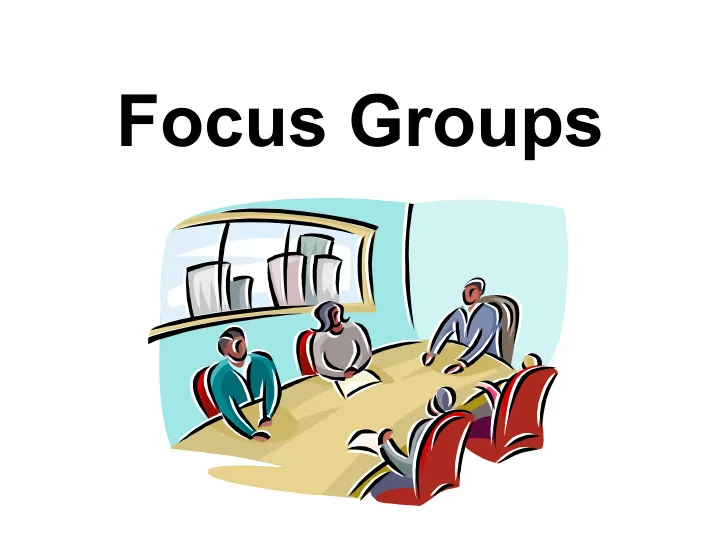

Focus Groups
A Focus Group Is . . . What • A carefully planned discussion • To obtain perceptions of a defined interest area 2
A Focus Group Is . . . Where • In a permissive, non-threatening environment 3
A Focus Group Is . . . Who • Approximately seven to ten people • With common characteristics relating to discussion topic 4
A Focus Group Is . . . How • Conducted by a trained interviewer (moderator, facilitator). • Three focus groups are the minimum for a study 5
Why Do Focus Groups? • To collect qualitative data • To determine feelings, perceptions and manner of thinking of participants regarding products, services, programs or opportunities • Attitudes and perceptions are developed in part by interaction with other people • To promote self-disclosure among participants • It's dangerous to take "customers" for granted 6
When to Conduct Focus Groups • Before a program begins, during a program or after a program ends • Focus groups are effective when o People have something to share (motivations) o The goal is to understand human behavior • Focus groups are not effective when o People are divided or angry o The goal is to gather factual information o Organization is trying to improve its image 7
Selecting Participants • Participants are similar • General selection rules: – Set exact specification – Maintain control of the selection process – Use the resources of the sponsoring organization in recruiting – Beware of bias – Develop a pool of eligible participants and then randomly select 8
Incentives for Participants • Money ($20-$50) • Food • Gifts • Positive, upbeat invitation 9
Systematic Notification Procedures 1. Set meeting times for interviews 2. Contact potential participants by phone or in person (2 weeks before meeting time) 3. Send a personalized invitation 4. Phone (or contact) each person the day before the focus group 10
Moderator Skills • Is mentally prepared • Selects appropriate location • Records the discussion • Uses purposeful small talk • Has a smooth & snappy introduction • Uses pauses and probes • Uses subtle group control • Controls reactions to participants • Selects the right moderator • Uses an assistant moderator • Uses appropriate conclusion 11
Beginning the Focus Group Discussion • The first few moments in focus group discussion are critical. – Create a thoughtful, permissive atmosphere – Provide the ground rules – Set the tone • Recommended introduction pattern: – Welcome – Overview and topic – Ground rules – First question 12
Asking Questions That Yield Powerful Information • Use open-ended questions • Avoid dichotomous questions • " Why?" is rarely asked • Use "think back" questions • Carefully prepare focus questions • Consider standardized questions 13
Systematic Analysis Process • Start while still in the group • Immediately after the focus group • Soon after the focus group--within hours analyze individual focus group • Later--within days analyze the series of focus groups • Finally, prepare the report 14
Focus Group Analysis Tips When analyzing focus group data, consider … • Words • Context • Internal consistency • Frequency or extensiveness of comments • Intensity of the comments • Specificity of responses • Find the big ideas 15
Reporting Focus Group Results • Use a communications strategy • Use an appropriate reporting style that the client finds helpful and meets expectations • Strive for enlightenment • Make points memorable • Use narrative or bulleted format • Give thought to the oral report 16
Recommend
More recommend